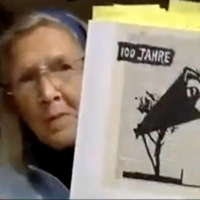 VIDEO PODCAST: Discussion about Bernard Haitink (1929-2021), Salzburg, Roger Doyle's Finnegans Wake Project, the English Symphony Orchestra, the Chopin Competition Warsaw, Los Angeles Opera and other subjects.
VIDEO PODCAST: Discussion about Bernard Haitink (1929-2021), Salzburg, Roger Doyle's Finnegans Wake Project, the English Symphony Orchestra, the Chopin Competition Warsaw, Los Angeles Opera and other subjects.
 DISCUSSION: What is a work? John Dante Prevedini leads a discussion about The performing artist as co-creator, including contributions from Halida Dinova, Yekaterina Lebedeva, Béla Hartmann, David Arditti and Stephen Francis Vasta.
DISCUSSION: What is a work? John Dante Prevedini leads a discussion about The performing artist as co-creator, including contributions from Halida Dinova, Yekaterina Lebedeva, Béla Hartmann, David Arditti and Stephen Francis Vasta.
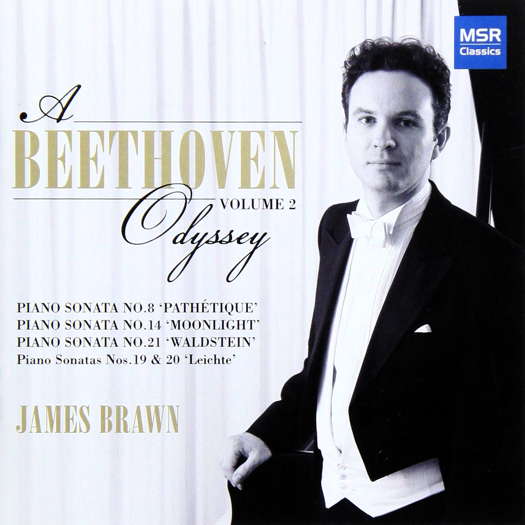 SPONSORED: CD Spotlight. Perfect Indeed - More Beethoven from James Brawn, recommended by Andrew Schartmann.
SPONSORED: CD Spotlight. Perfect Indeed - More Beethoven from James Brawn, recommended by Andrew Schartmann.
All sponsored features >>
LOST MUSIC FOR LOST SOULS

RICHARD MESZTO tells the story of the
re-discovery of Allan Rae's music for
'Charles Manson AKA Jesus Christ',
a play by Fabian Jennings
The history of the world is filled with missing books. The Biblical text 'Book of the Wars of the Lord' has not been located. We could do with a copy of The Isle of the Dogs (1597) by Nashe and Jonson. Umberto Eco made a successful novel out of the missing second book of Aristotle's Poetics in his 1980 novel The Name of the Rose.
In classical music the losses are great: many operas by Monteverdi, many works of J S Bach. Two operas by Arthur Fickenscher perished in the San Francisco earthquake of 1906. One modern composer's doctoral composition was discarded when the library purged its collection to make space. The list of the lost is seemingly endless.
And such loss afflicts the work of Canadian composer Allan Rae (born 1942), for while he has been vastly creative, and the library of his compositions is enormous, Time scatters creative work to the four winds. The musical score of Charles Manson AKA Jesus Christ is considered lost. As this particular 'rock musical' was last performed in 1971, the passing of decades could not have been kind. For one thing, Allan Rae has moved house some eighteen time since then. That's enough to cause drastic problems. One year, the basement was flooded. Scores stored there again were lost.
But, most important, Allan Rae has changed compositional styles. One of Canada's most eminent composers, he began musical life in concert bands and military bands, proceeded to jazz ensembles, then to rock music in musical theatre, then to electronic music, then classical music, then, as well, to sound design and music for some two hundred plays.
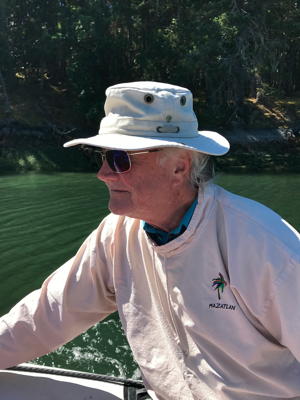
A recent photo of Allan Rae
All in all, some of these scores were lost, some mislaid, some are missing and some were discarded. When we began researching this article, Rae could not locate the music for this play. Fabian Jennings, the author of the play, did not have a copy of the music.
Daniel Smith's book 100 Things You Will Never Find contains a chapter on the collaborative composition by Wolfgang Amadeus Mozart and Antonio Salieri entitled Per la ricuperata salute di Ophelia. When Smith's book was published in 2014, the music for the cantata was still considered missing.
But, in 2015, the German composer and conductor Timo Jouko Herrman rediscovered the work. 'Give to the wind thy fears, hope and be undismayed' might be the motto of those searching for missing books and music.
Where then do you look for a musical score a half century after it was composed? The most obvious method is to begin with the libraries and archives.
Thus, step one: Allan Rae is a member of the Canadian Music Centre (which has launched a new CMC Canada website), and while his classical manner compositions are archived there (and available for loan), his jazz and theatre works are not. A dead end.
Fabian Jennings suggested that the Public Library of Toronto might have it. It did. But, only of the text of the play which was published in 1972.
WorldCat, a catalogue of the holdings of most of the world's libraries, also revealed that there were numerous other copies of this publication, including one in a library only a few miles away from the researcher. Again, only of the text of the play.
The good news then is that the text of the play survives in multiple copies, having been published by the Playwright's Co-op in Toronto.
Fabian Jennings was born in 1942 and studied mathematics and philosophy, obtaining an MA in the subject in 1970. He worked for a time as a reporter, but quickly turned to creative writing. The Manson play was his first, and it was a success, and so others followed, including a script for the 1975 Canadian film Recommendation for Mercy.
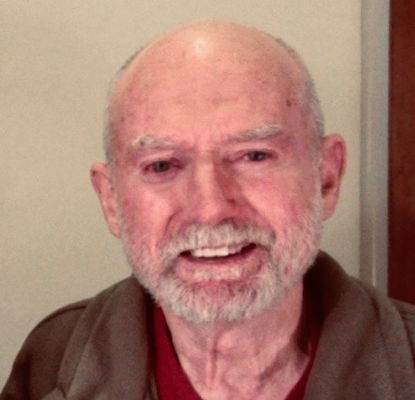
Fabian Jennings in 2016
He and Allan Rae also collaborated again on a vast theatrical project entitled Like Gods among Them. For many years Jennings has written poetry, been a woodworker and spent time in technical rock climbing.
It should be noted that Fabian Jennings has, however, revised Charles Manson AKA Jesus Christ since its publication in 1972. Perhaps in a concession to modern knowledge, he has removed a section of the stage directions that called for actors dressed as such long ago personalities as Janis Joplin, Colonel Sanders, Billy Graham, General Westmoreland, Jimmy Hendrix, John Lennon and Yoko Ono, Timothy Leary, and perhaps, above all, 'Annette Funicello in her Mickey Mouse costume'. This phantasmagorical scene was described as a 'black mass for America and its civilization' in Herbert Whittaker's 1971 review, seen in a press clipping from Allan Rae's collection; publication source unknown.
But, why should the author revisit this play at this time? Interestingly, there are some four films recently released which deal with the Manson story. Something about it is still resonating after all these years.
As research was underway for this article it occurred that it might be possible to contact some of the performers from the 1971 production, and among Allan Rae's press clippings was found a copy of the programme, which listed them. Sadly, while some names could be found, contact information could not. But, at the Wikipedia article for Saul Rubinek, one link mentioned the company that staged the play: Theatre Passe Muraille in Toronto, Canada. Could they still be active after all these years? What were the odds that the company was still operating after fifty years? Indeed, it is: www.passemuraille.ca
We have contacted the theatre company and while they said they did not have such material, they have told us that their archive has been donated to the University of Guelph Library. The trail was getting warmer. A search of the online catalogue revealed little. But, an email was sent. And another, and another.
I rather think that for most people the lurid tale of Charles Manson is well known. I will happily forgo repeating the information here. What is significant is that Manson is oft times considered a cult leader: he had terrifying ideas of cultural warfare and he was a manipulator of the highest calibre. He was also quite mad.
There can be little doubt that Manson had murderous notions of horrific extent. Jennings' play is much based on court transcripts. Let the play itself speak:
Prosecuting Attorney: Your honour, ladies and gentlemen of the jury, we have established beyond doubt that Charles Manson equated the biblical tale of Armageddon with a race war between the whites and blacks of this country, and that he convinced his followers to foment such a war by acts of treachery. He convinced them by using the Holy Bible and certain lyrics of the Beatles as his authority on the matter.
Of course, placed in this way, the utter absurdity of Manson's views should be obvious. Sadly, people who remain influenced by Manson and people who hold views similar to his, do not seem to see this. I leave it to others to connect this with an increasing use of racism among politicians. But, this in and of itself makes the play a current affairs subject and the rediscovery of the score - required for performance - essential, for it must be noted Allan Rae does not feel he is able to reconstruct the music from memory.
Manson evidently ran a cult and drew on several sources for his information. He studied L Ron Hubbard's Dianetics - the foundations to the modern Church Of Scientology - and was apparently well-versed in Dale Carnegie's teachings.
Warden: Alright ... Charlie, it says here, 'The only form of disciplined study in which the subject has participated since early grade school would appear to be a correspondence course while in jail based on Dale Carnegie's book, 'How to Win Friends and Influence People'. Surprisingly, he finished at the top of his class.' Now, I suppose that's what makes you think you can convince people. [Manson just shrugs. The warden continues, exasperated.] Charlie, where are you going to go? Do you know?
Manson knew his work in how to manipulate human beings - and this makes him one of a very long line of cult leaders; a line that is not yet exhausted in our world to this day. But, please note: there is a very clear connection with demagogues who whip up public emotion for their own political agenda.
Jennings is quite prepared to emphasize that Manson was the result of a catastrophic early life and extended jail time. The brutal and degrading prison system transformed him into a powerful monster:
Manson: My father is the jail house. My father is your system and it taught me well. I have survived twenty-two years in every torture chamber you have in this country. I have been made strong, stronger than any of you, and I have found my peace.
It should be evident by now that Jennings' play deals with issues and important aspects of cultural madness. There are overt political comments to be found here. And, I should remind the reader that politics in opera is not a rare thing.
For example, this article mentions five political operas - Nixon in China, X, The Life and Times of Malcolm X, Boris Godunov, Gloriana and Mulroney: The Opera - but really, there are more, such as Don Giovanni and, above all, Beethoven's Fidelio. Verdi's music had political content and effects, and so even did I Puritani.
Now, it was Shakespeare who said about such theatrical matters: 'for they are the abstract and brief chronicles of the time.' The right of drama - in this case musical drama - to comment on the current situation can hardly be questioned.
The 'rock opera', as it is called, is not quite that - one source described it as a 'rock musical-documentary-morality play'. It is a play with very extensive musical involvement far beyond what would be labeled 'sound design' in modern theatre. The dialogue is spoken and the on-stage band operates rather like the chorus in ancient Greek drama, commenting on the proceedings, opening up new emotional vistas, and offering a deeper view through music along with supporting some of the surreal enactments. Back in the mid 1970s, a Broadway production was considered. And evidently, the work deserves modern revival. But, Jennings is adamant that the play can not be performed without Allan Rae's music. So, how to proceed if the music is lost?
The musical numbers are:
Queer Sugar
Queer Beer
Scene a Dali
Goin' Back
Two Thousand Years Ago
Fucca Flats
(Note: the word 'queer' had not in 1971 fully acquired its current usage and referred only to the 'strange and odd,' not sexual orientation.)
The band was to include lead and bass guitar, drum and 'either an organ, synthesizer, or electric piano'.
The search for this score has been going on for almost two years. Having been put in contact with them by Theatre Passe Murraile, on Friday 2 August 2019, the University of Guelph Library produced an answer: they had the Theatre Passe Murraile archives and there, among the papers was a file with the score.
Within a few hours, the documents were scanned, payed for, and emailed. We now have 54 pages of lead sheets in the composer's hand - easily identifiable. As soon as we can, we shall obtain these files for the composer and playwright to examine, and hope that the materials are complete. Here's a sample page:
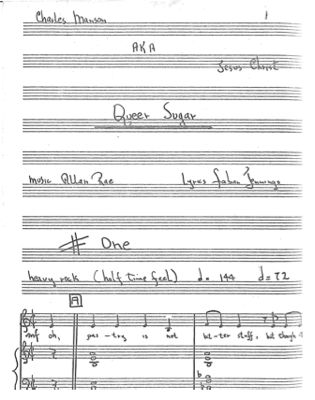
Music and text © 2019 Allan Rae and Fabian Jennings. Used with permission. Source: Theatre Passe Muraille fonds, L W Connelly Theatre Archives, University of Guelph. Used with Permission
Jennings' drug-soaked poem Queer Sugar is potent in its grim reality, and far in excess of The Beatles' sugar-coated and sanitized paean to LSD: Lucy in the Sky with Diamonds :
O, pastry is not bitter stuff,
But though it's sweet, not sweet enough
And straight sugar goes down flat and rough;
So sprinkle magic on the puff.
Children eating puffs of cream
In hopes to feed a rainbow dream,
But things are seldom what they seem
Along the curved and coloured beam.
Bend of beam is curve of scythe.
Grim the reaper, bodies writhe
Punctured lungs, twisted mouths,
As white puffs turn to blackened clouds,
And freaks engage in bloody trysts
And multiplying antichrists,
When the trip's a bummer, not a lark
And queer sugar makes the mind grow dark.
© 2019 Fabian Jennings. Used with permission.
Charles Manson AKA Jesus Christ is likely one of the first fictional or theatrical portrayals of these events. According to the voluminous Wikipedia article on Manson - a sad comment on our modern interests - the next fictional work was the 1976 television drama, Helter Skelter. Jennings and Rae were quick off the mark.
Jennings has written:
It's an attempt to understand him and what he revealed about the socially troubled America of the time. The play remains every bit as relevant even now, some 50 years later; something to which the rush to market the four films illustrates for better or worse. - draft of letter, sent via email to GR, 27 July 2019
About the successful premiere performance Urjo Kareda wrote:
It is a sign of our mad times that real life now presents the best material for surrealistic drama ... Theatre Passe Muraille moves impressively beyond simple shock tactics - the Sharon Tate murders, thank heaven, are never dramatized - to a production which is thoughtfully sober as it is theatrically absorbing, as mysteriously beautiful as it is disturbingly, successfully flashy. - The Toronto Star, Saturday, 21 November 1971, page 47
Sadly perhaps, the madness of those times remains true today. With the music rediscovered, performance is now possible. Perhaps too, as with the finding of the score, the finding of lost and missing souls can happen too. That is sorely needed. Without any question, this remarkable work will still hold a mirror up to our own age.
Copyright © 8 August 2019
Richard Meszto,
Amber Valley, Canada


